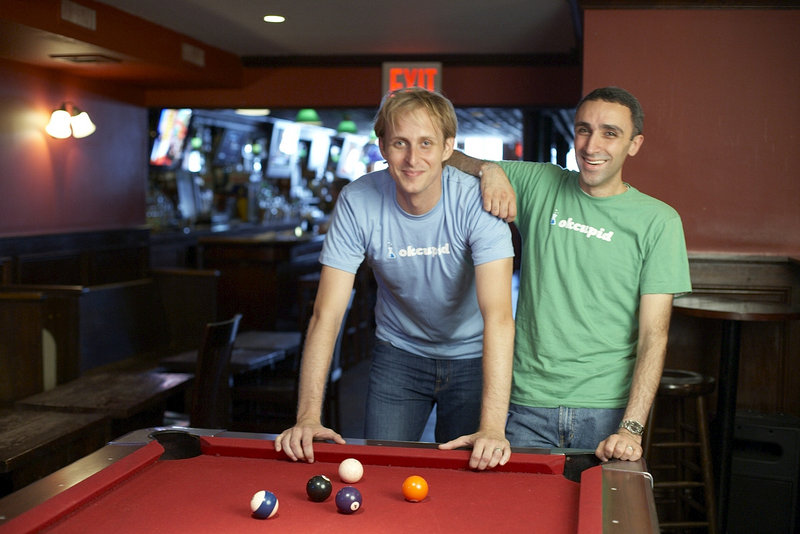You don’t need to be a dating expert to be smooth in the business of matchmaking.
Just ask Chris Coyne, the South Portland native who co-founded OkCupid.com. In its seven years, the online dating site has attracted millions of members and the attention of a multinational corporation, IAC, which bought OkCupid last month for $50 million.
Coyne, 33, who now lives on the Upper West Side of New York City, said he struggled with dating in high school.
“I basically dated none in high school, and some in college,” said Coyne. “Maybe if I had dated more … I wouldn’t have to have started (OkCupid).”
Coyne, who’s now married and has a 1-year-old daughter, attended South Portland High School, where he cultivated an interest in mathematics.
Coyne’s brother, Dan, who works at the Maine Center for Economic Policy in Augusta, said Chris was a “math whiz” in high school and a gifted writer and thinker with an entrepreneurial sense.
“I had no doubt he would be successful,” Dan Coyne said of his brother. “It was just a question of what he (was) passionate about.”
After high school, Chris Coyne attended Harvard University. In January 1999, just months before he graduated with a degree in mathematics, he started building TheSpark.com, a website tailored to younger readers with a mix of content, including e-cards, personality tests and humorous science projects.
A few months later, while other students were headed south for spring break, Coyne and his friends Sam Yagan and Max Krohn began work on SparkNotes.com, a site providing free online study guides for students.
The partners sold both websites to publicly traded iTurf in 2000. When iTurf’s stock crashed shortly after, the partners helped the company sell the sites to Barnes & Noble, which eventually shut down TheSpark.com but maintained SparkNotes.com.
In 2003, Coyne, Krohn and Yagan moved to the next project, a free online dating site that they called OkCupid and launched in 2004.
Unlike its competitors Match.com and eHarmony Inc., OkCupid is free to subscribers — advertisers pay business costs. Coyne is OkCupid’s creative director, coming up with new product ideas.
David Evans, an industry observer who runs the technology and branding consulting firm Digicraft and edits the blog www.onlinedatingpost.com, said the success of Spark and OkCupid earned Coyne and his partners a reputation for creating profitable online businesses supported by advertising dollars.
Coyne said OkCupid, based in New York City, attracted members in cities with many young, single adults, like New York. Membership growth has been slower in smaller cities like Portland, he said.
Today, the site has 1.3 million monthly unique users and 500,000 daily users. Coyne said 21,000 Mainers logged into OkCupid last month. He declined to discuss annual revenue, but said the company was profitable in 2010 and will likely be more profitable in 2011.
Coyne attributed OkCupid’s success partly to complex mathematical algorithms that match members with like-minded singles.
When OkCupid users sign in, they are prompted to answer a series of questions. Some are quite personal, such as, “How messy are you?” or “How frequently do you bathe or shower?”
Others address politics, religion and sex. There are even math questions, such as, “What is next in this series? 1, 4, 10, 19, 31, _.”
OkCupid also asks members how their ideal mates would answer the same questions. And users can rate the relevancy or importance of each question.
Coyne said computers evaluate the information and match members based on compatibility, or their likelihood of hitting it off. The process, which includes millions of computer operations, happens in one-twentieth of a second each time a member searches for dates, Coyne said.
Evans, the online dating blogger, called OkCupid’s algorithms the “black magic on the back end” of the business. He described Coyne and his partners as talented “computer science geeks” who are constantly “tweaking those algorithms to create better matches.”
Evans said OkCupid appeals primarily to young, educated, cultured, well-read and tech-savvy singles. He called the crowd hipsters.
It’s a demographic that Coyne said has helped OkCupid expand. “(They) are the ones who spread things around the Internet,” he said.
Last month, Coyne and his partners sold OkCupid to Match.com for $50 million. Match.com is a division of New York-based IAC/InterActiveCorp, a publicly traded company with $1.4 billion in annual revenue.
IAC already owns a host of dating sites, including BlackPeopleMeet.com, SingleParentMeet.com and LoveandSeek.com.
Coyne said he and his partners remain on staff and are busy improving OkCupid’s mobile applications, which run on smart phones. One day soon, he said, technology will allow OkCupid to notify members when a potential date is in the same geographic area.
“My phone will beep and tell me there is a perfect match nearby,” he said.
Staff Writer Jonathan Hemmerdinger can be reached at 791-6316 or at:
jhemmerdinger@mainetoday.com
Send questions/comments to the editors.



Success. Please wait for the page to reload. If the page does not reload within 5 seconds, please refresh the page.
Enter your email and password to access comments.
Hi, to comment on stories you must . This profile is in addition to your subscription and website login.
Already have a commenting profile? .
Invalid username/password.
Please check your email to confirm and complete your registration.
Only subscribers are eligible to post comments. Please subscribe or login first for digital access. Here’s why.
Use the form below to reset your password. When you've submitted your account email, we will send an email with a reset code.